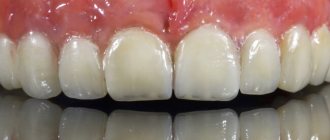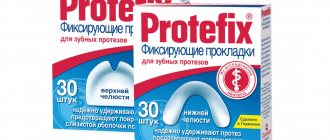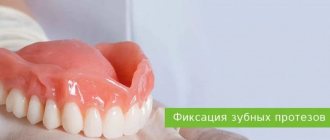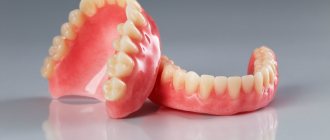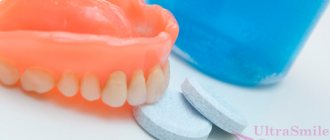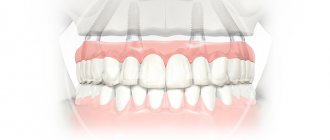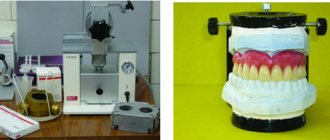One of the main problems that people with removable dentures face is insufficiently secure fixation. Despite careful individual selection, the structure can move while chewing food, talking, or laughing. This occurs due to insufficient adherence of the inner surface of the denture to the gum.
The solution to the problem is the use of special fixing substances. Today, the range of these products is widely represented in the windows of pharmacies and supermarkets. The products are produced in the form of a cream or gel.
Television advertising promises an immediate and long-lasting effect, but the consumer has a lot of questions: what to choose and should you believe the advertising?
Cream for fixing dentures
This is the most popular substance, suitable for all types of removable dental structures. Many customers ask the pharmacy for glue to fix dentures. But if you look at it, cream and glue are the same thing.
Yes, it really allows you to securely fix the removable structure on the surface of the gums. But which brand of denture bonding cream is best on the market?
Criteria for a quality fixing cream
- Duration of action
. The duration of fixation is one of the main characteristics. The instructions for modern creams state that they are able to hold a denture for 12-24 hours. It is more convenient when the fixation agent works all day long. In this case, there is no risk of unexpected detachment of the prosthesis at the most inopportune time. - Safety
. The fixing cream or glue should not contain substances that are toxic or damaging to the mucous membrane. This will ensure safe use of the product over a long period. - Structure
. Manufacturers specially produce fixing agents with different consistencies so that the consumer can choose the product for themselves. The gel is most often liquid, so it is easier to apply, but at the same time its consumption increases. Liquid products are recommended for the first time after dental prosthetics. Cream or glue has a thicker consistency. However, it must be applied in doses to the prosthesis, because an excess of the substance has a negative effect on the fixing properties. - Additional ingredients
. Thanks to the auxiliary components included in the cream, you can not only ensure reliable attachment of the denture, but also freshen your breath and reduce gum inflammation.
Recommendations from WHO and Rospotrebnadzor on vaccination for allergy sufferers
The presence of a disease is not a reason to refuse vaccination; even the slightest allergy to a Covid vaccine does not always occur; an existing disease does not interfere with the injection. Observe the following rules:
- if you are allergic to any components of the mRNA vaccine, you should not be vaccinated with this type of vaccine;
- if a reaction to the first dose of the drug develops, it is not recommended to receive a second dose of the same type of medication;
- You cannot get vaccinated during an exacerbation of an allergic disease;
- If you have allergies of any kind, especially drug allergies or reactions to vaccine components, make a decision about the appropriateness of the procedure with your doctor and be sure to warn the nurse performing the injections;
- If existing allergies are not related to taking medications, then you can and should be vaccinated against COVID-19.
In any case, if there are grounds for alarm or concern for your own health, remain under the supervision of a doctor after the procedure for at least half an hour. As practice shows, Russian vaccines are a guaranteed safe vaccination against coronavirus; risks are minimized by pre-vaccination examinations.
Cream "Korega" for dentures
One of the leaders in the fixing agents market. The line consists of 3 types:
- extra strong mint;
- neutral;
- refreshing.
According to data, it ensures fixation of a removable denture throughout the whole day. It comes with mint or neutral flavor. The cream does not contain zinc, so it can be used on an ongoing basis.
How to apply cream
Fixing cream for dentures "Korega" is applied in strips to the inside of the previously cleaned insert structure. It is also necessary to rinse your mouth to remove any remaining food.
After pressing the prosthesis to the gums, the product should not enter the oral cavity. After attaching the structure, it is not recommended to immediately start eating. For strong fixation, you need to wait 10-15 minutes.
Removing the prosthesis
Corega glue reliably fixes dentures, so it is possible that you will need to remove the structure yourself at the end of the day. It's easy to do:
- First you need to rinse your mouth with warm water.
- Then, using rocking movements, try to remove the denture from the oral cavity.
- If it is still fixed, you need to lightly press on the gum mucosa from the cheeks and remove the denture.
- After removing the denture from the oral cavity, it should be thoroughly rinsed using special products recommended by the manufacturer of the fixing cream.
How to use it correctly
Regardless of consistency, price and manufacturer, most fixing creams are used in an identical way:
- Wash the removable product thoroughly with a soft brush and soapy water, and air dry for a couple of minutes.
- Next we use the cream itself. Almost every instruction shows a visual illustration of where the product needs to be applied.
- Put on the prosthesis in the standard way, carefully pressing it against the mucous membrane for at least one minute.
- Try to eliminate food and even water for half an hour.
- Before removing your orthotic, first rinse your mouth with warm water.
The frequency of use of the cream depends on the duration of fixation. This information can be read on the packaging. Experts do not recommend using this product more than once a day. Otherwise, irritation of the mucous membrane and even allergies may begin.
Cream "Rox" for dentures
Another popular means for fixing dentures is Rox cream. This is a joint development of domestic and European specialists, capable of holding a removable structure for 12 hours even when drinking hot drinks. The mint extracts included in the composition freshen breath for a long time.
Among the features of the cream are:
- No dyes or zinc, which makes it safe for long-term use.
- Suitable for prostheses made of various materials. Rox glue is suitable for fixing dentures made of plastic, nylon and other composites.
- Economical. Due to the dense structure of the cream, consumption is minimal. One tube will last approximately 1.5-2 months.
- Application. Rox cream can be applied to both dry and wet dentures. This does not affect the quality of fixation.
- Availability. You can buy Rox cream for dentures in almost every pharmacy or supermarket.
The production of fixatives for dentures continues to develop, and new, better quality creams appear periodically. It is quite difficult to keep track of this on your own. Therefore, if you want to choose the best cream for fixing dentures, consult your dentist.
Immunoglobulin tests if you have allergies
The working units of our immune system are specific protein antibodies, immunoglobulins. They are the first to react to the penetration of foreign biomaterials or allergens into the body. All antibodies are divided into 5 classes.
Immunoglobulin E (IgE) is an important parameter of the humoral immunity, produced by the submucosal layer of body tissue in response to exposure to allergens. He is responsible for the immediate manifestation of an allergic reaction. Additionally, it is involved in the creation of anthelmintic immune defense. Accordingly, an increase or decrease in the level of immunoglobulin E in the blood indicates either an allergic reaction or helminthiasis.
An IgE test is prescribed if:
- bronchial asthma;
- rhinitis of allergic origin;
- atopic dermatitis;
- allergies to food or medications.
The first stage of diagnosis involves searching for a group of allergens that causes sensitization to the patient. The second is identifying individual allergens. An increase in IgE reaction signals the need to avoid contact with the substance, as well as with the product containing it.
Phadia AB is a recognized world leader in the development of in vitro diagnostic systems for allergic and autoimmune diseases. Today, the accurate and stable ImmunoCAP®️ technology is the “gold standard” for allergy diagnostics.
Gel for dentures
The range of gels for fixing dentures is quite limited, since they have a number of disadvantages compared to creams:
- Short fixation time. Due to the characteristics of the composition, the gel must be applied more often than cream, which causes some discomfort.
- Food restrictions. When attaching dentures with gel, it is not recommended to consume hot food or drinks.
- Big expense. The liquid consistency of the gel leads to increased consumption.
Gels are mainly used immediately after prosthetics, so that the patient learns to apply the correct amount of substance to the removable structure. When you press the prosthesis to the gum, the excess product will flow out on its own, but the fixation will still take place.
Which denture gel is best? A qualified dentist can answer this question. In any case, when choosing a product from a well-known manufacturer, you can be sure of its good quality.
Rules of application
Corega cream for fixing dentures allows you to obtain maximum adhesion only if you follow the following instructions:
- Apply the product only to a previously clean and dry structure. For cleaning, you can use Corega tablets.
- The cream is distributed pointwise using a dispenser into the recess of the structure, 1 time per day.
- Before installing the denture, rinse your mouth with water.
- Press your jaws tightly for a couple of seconds after the product has been inserted into the oral cavity.
- Remove any remaining product using a cloth previously treated with oil.
- After use, close the tube of cream tightly.
- Do not wash or handle the tube lid with wet hands.
- Store this product unopened, and when the expiration date expires, the product is no longer suitable for use.
Adverse reactions
The best cream for fixing dentures should not only be effective, but also not give adverse reactions even with long-term use. In case of an overdose of the drug, the following symptoms may occur:
- increased salivation;
- nausea, possible vomiting;
- general malaise;
- allergic reactions.
If you notice such manifestations, immediately visit your dentist: he will help you choose a remedy that will not cause unwanted reactions.
Criterias of choice
It's hard to say which cream is the best. If you are prone to allergic reactions, we recommend choosing transparent gels without fragrances or dyes. Creams and gels are almost identical in effect, but the first option has a thicker consistency. Let's look at some more useful tips:
- Choose a large-volume tube, it is much more profitable.
- Give preference to products with long-lasting fixation.
- Read the ingredients, do not take creams with a lot of chemical components.
- The price is not so important, but the manufacturer is worth paying attention to. You should not buy little-known products of questionable quality.
If you are in doubt and cannot make a choice, contact a specialist. Depending on the wishes and characteristics of the body, the dentist will advise the best option.
Preparing for the study
Laboratory testing uses the patient's venous blood for analysis. To increase the reliability of the result, it is recommended:
- take blood samples in the morning from 8:00 to 10:00;
- submit material for research on an empty stomach;
- on the eve of the study, reduce physical, sports and emotional stress, eliminate smoking and alcohol.
It is allowed to drink a small amount of clean drinking water without gas.
Laboratory diagnostics before vaccination against COVID-19
Immunoglobulin tests are a mandatory examination before vaccination in the presence of drug allergies. The study, as prescribed by a doctor or at your own request, is carried out at the AMC-Medionika clinic in Moscow and is the key to a successful outcome of subsequent immunization. The clinic guarantees:
- reliability of the result;
- speed of obtaining indicators;
- no queues;
- affordable prices for research.
If you wish, you can get advice from an experienced specialist on deciphering the received data. You will be received by highly qualified specialists with many years of experience.
Check your immune status before vaccination to eliminate any risks after vaccination against coronavirus, and make an informed decision about the advisability of vaccination at this stage.


